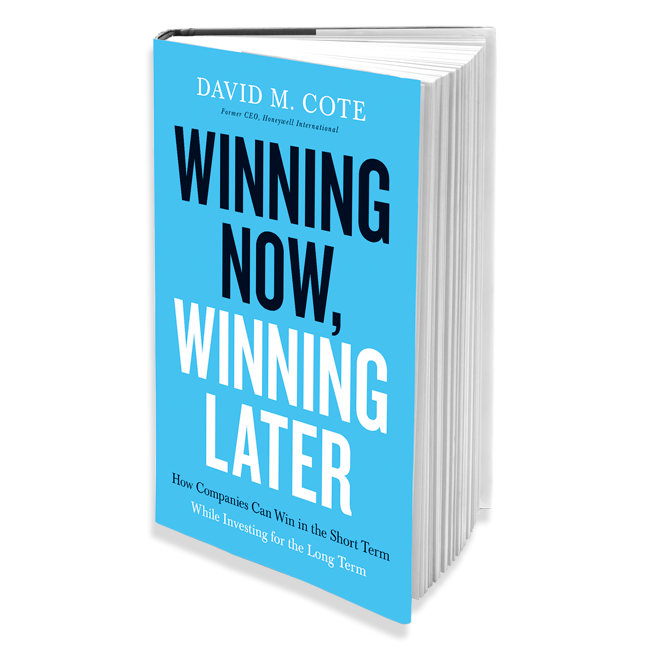霍尼韦尔前首席执行官高德威(David Cote)谈论企业领导力的新书《赢在当下,赢在未来》(Winning Now, Winning Later)已于6月30日上架。按照《财富》杂志此前的说法,这本大部头巨著堪称商业书籍中的《战争与和平》(The War and Peace)。此书不仅洋溢着弥足珍贵的管理经验,还讲述了许多引人入胜的美国企业故事。它很有可能成为激励新一代领导者的典范之作。

这本书主要论述了每位领导者所面临的紧张局面:既要满足华尔街当下的要求,又要投下重注来确保未来的发展。
但在个人层面,高德威也深入研究了领导力问题,包括他自己如何从琐碎的日常工作中挤出时间来思考重大课题。他列出了有效领导大型组织所需的三大要素:调动团队的积极性、选择正确的方向、让人们朝着这个方向前进。
他写道:“大多数人过分重视第一点。”令人惊讶的是,在高德威看来,集结队伍只占全部工作的5%。“它跟发表寓意崇高的演讲无关。”成功取决于另外95%的工作,即制定正确的战略,并及时跟进,以确保该战略执行到位。“与动员团队相比,这是一项更基础的工作。”
他告诉我,“如果你确定好了战略和方向,你就可以把95%的时间用在改善执行方面,这反过来又会降低成本,从而腾出更多的现金用于季度利润和新投资。”
为了确保自己有足够的空间进行深入思考,并确定方向,高德威采用了一套非常规做法。
在他的整个职业生涯中,高德威每个月都会留出两到三天的时间,不作任何工作安排,只是专心致志地思考旨在引领霍尼韦尔驶入新方向的大胆计划——或者做一些率性而为的事情。他把这些日子称为“X天”。
“由于紧急情况,我失去了一些X天,但每年我确实会利用大约20个这样的日子。”他说,“比如,我可能会在事先完全没有打招呼的情况下,突然造访工厂。”
在路易斯安那州一家工厂发生事故,导致一名工人身亡之后,高德威没有告诉任何下属,就在一个X天飞抵该州,然后租车前往事发工厂。“我只是不相信他们已经解决了安全问题。我没有提前通知,以便亲眼目睹工厂和工人的实际情况。我不想聆听那些事先排练过的故事,更不想看到为了应付我而粉刷一新的墙壁。”高德威说。
在剩余的X天,他经常进行不拘泥于固定模式的思考。“我经常待在办公室里。”他回忆道,“那里有一个巨大的鱼缸,但在最初那几天,我并没有意识到它有多美。我在流媒体上随机播放1.2万首歌曲,听的音乐从爵士乐、乡村音乐到嘻哈音乐,从另类摇滚到歌剧,无所不包。有些人觉得这会让人分心。但我觉得嘻哈音乐很有启发性。”
高德威把专门用来思考的日子称为“蓝皮书日”,因为他经常把自己的想法记在一个蓝色笔记本上。“我任由自己的思绪肆意漂浮,但并非漫无目的地。”他在接受采访时说,“我会尝试着构思一些大的想法。正是在一个‘蓝皮书日’,我萌发了学习丰田生产系统的念头,并由此开发出了后来的霍尼韦尔操作系统。”
我们建议所有的培训领导者在接下来的X天悉心阅读高德威的大作。(财富中文网)
译者:任文科
霍尼韦尔前首席执行官高德威(David Cote)谈论企业领导力的新书《赢在当下,赢在未来》(Winning Now, Winning Later)已于6月30日上架。按照《财富》杂志此前的说法,这本大部头巨著堪称商业书籍中的《战争与和平》(The War and Peace)。此书不仅洋溢着弥足珍贵的管理经验,还讲述了许多引人入胜的美国企业故事。它很有可能成为激励新一代领导者的典范之作。
这本书主要论述了每位领导者所面临的紧张局面:既要满足华尔街当下的要求,又要投下重注来确保未来的发展。
但在个人层面,高德威也深入研究了领导力问题,包括他自己如何从琐碎的日常工作中挤出时间来思考重大课题。他列出了有效领导大型组织所需的三大要素:调动团队的积极性、选择正确的方向、让人们朝着这个方向前进。
他写道:“大多数人过分重视第一点。”令人惊讶的是,在高德威看来,集结队伍只占全部工作的5%。“它跟发表寓意崇高的演讲无关。”成功取决于另外95%的工作,即制定正确的战略,并及时跟进,以确保该战略执行到位。“与动员团队相比,这是一项更基础的工作。”
他告诉我,“如果你确定好了战略和方向,你就可以把95%的时间用在改善执行方面,这反过来又会降低成本,从而腾出更多的现金用于季度利润和新投资。”
为了确保自己有足够的空间进行深入思考,并确定方向,高德威采用了一套非常规做法。
在他的整个职业生涯中,高德威每个月都会留出两到三天的时间,不作任何工作安排,只是专心致志地思考旨在引领霍尼韦尔驶入新方向的大胆计划——或者做一些率性而为的事情。他把这些日子称为“X天”。
“由于紧急情况,我失去了一些X天,但每年我确实会利用大约20个这样的日子。”他说,“比如,我可能会在事先完全没有打招呼的情况下,突然造访工厂。”
在路易斯安那州一家工厂发生事故,导致一名工人身亡之后,高德威没有告诉任何下属,就在一个X天飞抵该州,然后租车前往事发工厂。“我只是不相信他们已经解决了安全问题。我没有提前通知,以便亲眼目睹工厂和工人的实际情况。我不想聆听那些事先排练过的故事,更不想看到为了应付我而粉刷一新的墙壁。”高德威说。
在剩余的X天,他经常进行不拘泥于固定模式的思考。“我经常待在办公室里。”他回忆道,“那里有一个巨大的鱼缸,但在最初那几天,我并没有意识到它有多美。我在流媒体上随机播放1.2万首歌曲,听的音乐从爵士乐、乡村音乐到嘻哈音乐,从另类摇滚到歌剧,无所不包。有些人觉得这会让人分心。但我觉得嘻哈音乐很有启发性。”
高德威把专门用来思考的日子称为“蓝皮书日”,因为他经常把自己的想法记在一个蓝色笔记本上。“我任由自己的思绪肆意漂浮,但并非漫无目的地。”他在接受采访时说,“我会尝试着构思一些大的想法。正是在一个‘蓝皮书日’,我萌发了学习丰田生产系统的念头,并由此开发出了后来的霍尼韦尔操作系统。”
我们建议所有的培训领导者在接下来的X天悉心阅读高德威的大作。(财富中文网)
译者:任文科
In his new book on corporate leadership, Winning Now, Winning Later, which debuts June 30, former Honeywell CEO David Cote has written what Fortune previously dubbed The War and Peace of business books. The tome, which is packed with management lessons and riveting stories from the trenches of corporate America and hits shelves June 30, is likely to inspire a new generation of leaders in training.
The book primarily deals with the tension every leader faces: satisfying Wall Street today, while still placing the big bets that will ensure growth down the line.
But on a personal level, Cote also delves deep about leadership, including his own processes for finding time to think big thoughts amid the daily grind. He lays out three elements of leading a large organization effectively: mobilizing groups of people, picking the right direction, and getting people moving in that direction. "Most people overemphasize the first one," he writes. Surprisingly, Cote says that rallying the troops is only 5% of the job. "It's not about giving lofty speeches," he writes. Ninety-five percent of success is setting the right strategy and following up to ensure it's carried out. "It's even more basic than that," he told me. "If you get the strategy and direction right, you can spent 95% of the time on improving execution, which in turn lowers costs and frees up more cash both for quarterly profits and new investment."
And Cote highlights his own unorthodox routine for making sure he had enough space to think and set that direction. Throughout his career, Cote set aside two or three full days a month with nothing on his schedule so that he could hatch daring plans to take Honeywell in new directions, and for other modes of improvisation. He called them "X days." "I lost some of the X days because of emergencies, but I did use about 20 a year," he says. "I'd use some of them to make surprise visits to plants totally unannounced." After a worker died in an accident at a plant in Louisiana, Cote hopped a flight on an X day without telling anyone on his staff, then rented a car and drove to the factory. "I just didn't trust that they'd resolved the safety issues. I didn't give any advanced notice so I could see the plant and the people exactly as they were, and didn't have to listen to rehearsed stories or see freshly painted walls," says Cote.
The remainder of the X days he used for unstructured thinking. "Often I'd just stay in my office," he recalls. "I had a big, gorgeous fish tank, but after the first few days I didn't notice how beautiful it was. I had 12,000 songs that I'd put on random streaming, listening to everything from jazz to country to hip-hop to alternative rock to opera. Some people find that distracting. I find hip-hop inspiring."
Cote dubbed the days reserved for reflection as "blue book days" because he would jot down his ideas in a blue notebook. "I just let my mind wander, but not aimlessly," he said in an interview. "I'd try to come up with big ideas. It was on a blue book day that I hatched the idea to study the Toyota Production System and develop what became the Honeywell Operating System."
We'd recommend any leaders in training spend their next X day reading Cote's book.






